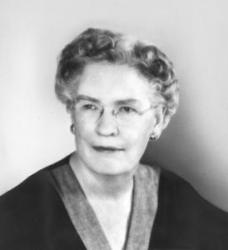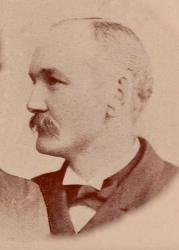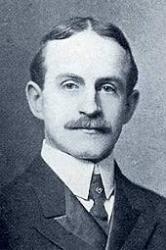Planning worship?
Check out our sister site, ZeteoSearch.org,
for 20+ additional resources related to your search.
- |
User Links
Person Results
Georgia Elma Harkness

1891 - 1974 Person Name: Georgia E. Harkness Scripture: John 8:12 Author of "Hope of the World" in Psalter Hymnal (Gray) Georgia Elma Harkness (1891-1974), first woman to teach theology in an American seminary, was once a household name, but few today know who she is–and all of her writings are out of print. We need to recover the work of this neglected theologian for the life of the church today.
Born 21 April 1891, Harkness was the youngest of four children born to Joseph Warren Harkness and Lillie Merrill Harkness. She was born in Harkness, NY, a town in the Adirondacks named for her grandfather. A Methodist, she was personally converted in a revival as a teenager, and sensed a calling to serve the church. Her family was upper middle class and progressive, thereby giving her opportunities for education beyond what was available to most girls and women of her era. Avoiding the women’s colleges, she earned a B.A. (philosophy) from Cornell University in 1912.
In a later age, Harkness would probably have gone straight to a seminary and training for the ministry, but seminaries did not admit women as regular, degree-seeking, students and ordained women were very rare. Harkness intended to volunteer for overseas mission work after her graduation from Cornell, but family problems prevented this. She taught high school for six (6) years, but was restless. She wanted to do more to serve the church and she wanted to pursue studies in theology. So, she went to Boston University (related to the Methodists). Denied entrance because of her sex to BU’s School of Theology, she matriculated in the Department of Religion of the Graduate School and earned a Ph.D. in philosophy of religion in 1923 with a dissertation entitled, ”The Relations Between Philosophy of Religion and Ethics in the Thought of Thomas Hill Green.” (Green (1836-1882), was a liberal British Idealist philosopher and social reformer who died 10 years before Harkness’ birth. )
For the next 15 years, Harkness taught courses in religion and philosophy at Elmira College in Elmira, NY–at the time a women’s college, but now co-educational. During summers and sabbatical leaves, Harkness continued her theological education by attending Harvard Divinity School, Yale Divinity School, and Union Theological Seminary (NY) always with the status of “special” (non-degree) student. In 1926, she was ordained by the Methodist Church (later part of the United Methodist Church), but, along with all other women, she was not admitted to any Conference (and, thus, could not function as a minister) until 1956.
From 1937 to 1940, Harkness was Professor of Philosophy and Religious Studies at Mount Holyoke College in Massachussetts and from 1940-1949, she was Professor of Applied Theology at Garrett Biblical Institute near Chicago, IL. Garrett Biblical Institute, now known as Garrett-Evangelical Theological Seminary, is a post-baccalaureate Methodist theological seminary whose main mission is the preparation of divinity students for ordained ministry. Harkness was the first woman hired to teach theology at any seminary in the U.S. Today, the Chair of Applied Theology at Garrett-Evangelical Theological Seminary is known as the Georgia Harkness Chair of Applied Theology. Harkness ended her active teaching ministry at The Pacific School of Religion, an ecumenical seminary related to the United Church of Christ outside of San Francisco,CA. She was Professor of Applied Theology at PSR from 1949 until her retirement in 1960.
Her early interests in global missions and in global and ecumenical Christianity never left Harkness. Unable to be a missionary herself, Harkness did support work for Methodist global missions, including writing materials for them, especially the Methodist Board of World Peace and and the Board of Social and Economic Relations. After World War II, Harkness also did much to support the global ecumenical work of the World Council of Churches, serving on both the Faith and Order and Church and World Commissions. Her hymn, “The Hope of the World,” was chosen by the Hymn Society of America (now the Hymn Society in the United States and Canada) for the Second global meeting of the World Council of Churches which was held in Evanston, IL in 1954 and had as it’s theme, “Christ, the Hope of the World.” Harkness had previously played key roles in the Life and Work conference at Oxford (1937), and at the first assembly of the World Council of Churches in Amsterdam, 1948. In the 1957-1958 school year, Harkness served as Visiting Professor at both the International Christian University in Japan and the ecumenical Union Theological Seminary, Manila, the Philippines.
This pioneer for women in ministry and early feminist theologian usually was irenic and balanced in her approach to such matters. Living in a very patriarchal and sexist era, she knew the dangers of appearing to male-dominated structures as “shrill,” or “strident,” in her advocacy of equality, and so was quick to praise opening or partial steps even while continuing to push for full gender equality in home, church, and society. Typical of Harkness’ approach on these matters, she advocated equal ordination and ministry for decades, but when the 1956 Methodist meeting in Minneapolis opened the door for full pastoral ministry for women, Harkness let younger female colleagues take the lead in advocating for the motion on the floor. However, her caution did not mean timidity, for at the World Council of Churches in 1948, Harkness openly confronted Karl Barth himself on his theology of female subordination! Though Barth’s influence intimidated many, Harkness refuted him point-by-point in open debate and the great man’s startled reaction showed that he was completely unused to confronting strong, independent women! (A year later, when someone mentioned the event to him, Barth replied, “Remember me not of that woman!”)
Harkness wrote over 30 books in her lifetime. She dealt with numerous theological subjects: Christian ethics, social concern in global contexts, equality of the sexes, racial equality and integration (though she was not an active participant in the Civil Rights struggle, she openly supported its goals and there was much personal correspondence between Harkness and African America leaders such as Martin Luther King, Jr., and Howard Thurman), the nature of the church, a study from her own Wesleyan Methodist perspective of Calvin’s ethics, prayer and the life of devotion, mysticism, the Holy Spirit, eschatology (partially anticipating themes later made more prominent by Wolfhart Pannenberg and Jürgen Moltmann), the relation of religion to philosophy and to science, secularism (which she saw as more of a challenge than a reason to celebrate, contrasting with the early work of Harvey Cox), and apologetics. Concerned to be understood by a wide audience, Harkness wrote with clarity and a refusal to cloak her thought in academic obscurantism (which led her critics to charge her with a lack of depth or profundity), but always a wide awareness of the history of Christian thought and of current trends on the global scene.
She characterized her theological perspective as that of a “chastened liberalism.” She had been raised in the optimism of the late 19th C., been educated in the traditions of Idealism and Borden Parker Bowne’s “Boston Personalism,” as well as the Social Gospel. Even after World War I and into the Great Depression, Harkness could declare her faith in human moral progress, her strong pacifism, and rejoice that belief in Original Sin was disappearing. “The faster it goes, the better,” she remarked to The Christian Century. Yet she interacted with the rise of Neoorthodoxy in the perspectives of Barth, Brunner, Suzanne de Dietrich, Reinhold Niebuhr, and Paul Tillich. On the eve of the Second World War, Harkness called on liberal Protestantism to recall the meaning of the cross and the power of the resurrection. Not surrendering her pacifism, she stated that although she remained committed to liberalism, “it was a chastened and deepened liberalism.” Human moral progress was possible, but did not follow an evolutionary certainty, and was dependant always on the grace of God. She still considered traditional formulations of original sin to be problematic, but recognized anew the power of sin in both individuals and social structures.
Harkness’ books are entirely out of print and the influence she once had is largely eclipsed, even among contemporary feminist theologians. Yet the Chair of Applied Theology at Garrett-Evangelical Theological Seminary is named for her and so is a scholarship for women ministry students over 30 at Pacific School of Religion. The church historian Rosemary Skinner Keller wrote a secondary study of Harkness, Georgia Harkness: For Such a Time as This (Abingdon Press, 1992) and in the Doctrine volume of his 3-part Systematic Theology, James Wm. McClendon lists Harkness (along with Walter Rauschenbusch, E.Y. Mullins, D.C. MacIntosh, W.T. Conner, and Dale Moody) as among the guiding forerunners of his approach. Rebekah Miles, Professor of Ethics at Southern Methodist University’s Perkins School of Theology, has just edited a reader of Harkness’ early essays, Georgia Harkness: The Remaking of a Liberal Theologian (Westminster/John Knox Press, 2010). Miles had previously written a biographical and theological sketch of Harkness as a chapter in Makers of Christian Theology in America, ed., Mark Toulouse and James Duke (Nashville: Abingdon Press, 1997).
--pilgrimpathways.wordpress.com/2010/02/20/
Georgia Elma Harkness
Geo. D. Elderkin

1845 - 1928 Person Name: George D. Elderkin Scripture: John 8:12 Adapter of "Hark! the Herald Angels Sing (Jesus, the Light of the world)" in The New Century Hymnal Almost nothing is known about George D. Elderkin (b. 1845; d. 1928). There was a George D. Elderkin Publishing Company in Chicago which published four collections of gospel hymns entitled The Finest of the Wheat. Book Three (1904) includes 259 songs, including music by both George D. and George W. Elderkin, “for prayer and evangelistic meetings, church and missionary services, Sunday schools and young people’s societies,” and was edited by Geo. D. Elderkin, C. C. McCabe, Wm. J. Kirkpatrick, H. L. Gilmour, G. W. Elderikn, and F. A. Hardon.” It was hardbound, and sold for 30 cents per copy, postpaid.
Emily Brink
Geo. D. Elderkin
William Hiram Foulkes
1877 - 1961 Person Name: William H. Foulkes Scripture: John 8:32 Author of "Take Thou Our Minds, Dear Lord" in The Presbyterian Hymnal Born: June 26, 1877, Quincy, Michigan.
Died: December 9, 1961, Smithtown, New York.
Buried: Smithtown, New York.
Foulkes graduated from the College of Emporia, Kansas, in 1897 and went on to the McCormick Theological Seminary, Chicago, Illinois; he received the Bernadine Orme Smith Fellowship, and studied for a year at New College in Edinburgh, Scotland. He later pastored at Presbyterian churches in Elmira, Illinois; Portland, Oregon; New York City; Cleveland, Ohio; and Newark, New Jersey. He served as General Secretary of the Board of Ministerial Relief and Sustentation (1913-18), as chairman of the New Era Movement, on the General Council of the Presbyterian Church, and as moderator of the General Assembly (1937).
Lyrics:
Gird Us, O God, with Humble Might
Take Thou Our Minds, Dear Lord
--www.hymntime.com/tch/
William Hiram Foulkes
Calvin Weiss Laufer

1874 - 1938 Scripture: John 8:32 Composer of "HALL" in The Presbyterian Hymnal Presbyterian minister and hymnographer Calvin Weiss Laufer was born today in Brodheadsville, Pennsylvania in 1874. Following his graduation from Union Seminary in 1900 he was ordained into the Presbyterian ministry and led congregations in New York and New Jersey for several years.
Laufer had a generally cheerful outlook on his Christian life, and his first two books, Key-Notes of Optimism (1911) and The Incomparable Christ (1914) expressed that viewpoint. A review of the first book spoke of the "crisp and stirring note in these sermonettes which is well calculated to rouse the mind of readers and banish dejection." His books were popular in their time but today are seen as somewhat superficial.
He later began to work with the Presbyterian Board of Christian Education and became its editor of musical publications, producing books such as The Junior Church School Hymnal (1927), The Church School Hymnal for Youth (1928) and When the Little Child Wants to Sing (1935). He was also the associate editor of the Presbyterian Hymnal of 1933, a very popular book which was used in many churches for more than fifty years.
In 1932, his book Hymn Lore was published, which contained the stories of fifty hymns from The Church School Hymnal for Youth, with information about their writers and composers (much like this blog). He chose a broad range of hymns, some quite modern and others well-known and loved for centuries. Several of them were by his mentor and friend Louis F. Benson, who had edited the Presbyterian Hymnal of 1895 and its 1911 revision (and also wrote The Best Church Hymns). In the preface to Hymn Lore, Laufer wrote:
To live with hymns and to make them one's own is the only sure way of appreciating their literary beauty and spiritual power. (...) That the reading and singing of hymns may become less mechanical, more thoughtful and intelligent, and emotionally more effective, this volume is released to the public.
Laufer wrote both hymn texts and tunes himself, most of which first appeared in the books he edited but also had some life outside Presbyterian circles. This tune was written while Laufer was attending a conference in Kansas, though with no particular text in mind. Not long after, he hummed it to a friend, William H. Foulkes, who then wrote the text "Take thou our minds, dear Lord."
Laufer's tune was originally called STONY BROOK, but he changed it to honor a friend, William Ralph Hall. Little is known about the writer May Pierpont Hoyt. Her text is generally sung to the tune BREAD OF LIFE by William F. Sherwin, but since that tune is more known with "Break thou the Bread of life," this text could use a different one.
--conjubilant.blogspot.com/2010/04/
Calvin Weiss Laufer
John Stainer

1840 - 1901 Scripture: John 8:36 Composer of "ALL FOR JESUS" in The Worshiping Church
John Stainer
Paul Leddington Wright
b. 1951 Person Name: Paul Leddington Wright, b. 1951 Scripture: John 8:12 Arranger of "[Light of the world, you stepped down into darkness]" in Singing the Faith
Paul Leddington Wright
Jack Copley Winslow
1882 - 1974 Person Name: Jack Copley Winslow (1882-1974) Scripture: John 8:31-32 Author of "Lord of creation, to you be all praise!" in Church Hymnary (4th ed.) John (Jack) Copley Winslow (b. Hanworth, Middlesex, England, 1882; d. Godalming, Surrey, England, 1974)Winslow was educated at Balliol College in Oxford and Wells Theological College, and was ordained a priest in the Church of England in 1908. After serving at Wimbledon and lecturing at St. Augustine's College in Canterbury, he worked as a missionary in India (1914-1934). He returned to England and served as parish priest and chaplain at a number of churches, including Lee Abbey in Lynton (1948-1962). His publications include The Church in Action (1936), The Christian Approach to the Hindus (1958), and Modern Miracles (1968). His hymns were published in Hymns Ancient and Modern (1950) as well as in various other hymnals.
Psalter Hymnal Handbook, 1987
Jack Copley Winslow
Thomas H. Troeger

1945 - 2022 Person Name: Thomas H. Troeger (b. 1945) Scripture: John 8:12 Author of "May the Church at prayer recall" in Church Hymnary (4th ed.) Thomas Troeger (1945-2022), professor of Christian communication at Yale Divinity school, was a well known preacher, poet, and musician. He was a fellow of Silliman College, held a B.A. from Yale University; B.D. Colgate Rochester Divinity School; S.T. D. Dickinson College, and was awarded an honorary D.D. from Virginia Theological Seminary. He was ordained in the Presbyterian Church in 1970 and the Episcopal Church in 1999, and remained dually aligned with both traditions. Troerger led conferences and lectures in worship and preaching throughout North America, as well as in Denmark, Holland, Australia, Japan, and Africa. He served as national chaplain to the American Guild of Organists, and for at least three years he hosted the Season of Worship broadcast for Cokesbury. He was president of the Academy of Homiletics as well as Societas Homiletica. He had, as of 2009, written 22 books in the areas of preaching, poetry, hymnody, and worship. Many of his hymn texts are found in New Hymns for the Lectionary (Oxford, 1992), and God, You Made All Things for Singing (Oxford, 2009).
Laura de Jong
Thomas H. Troeger
Bernard Geoffroy
b. 1946 Person Name: Bernard Geoffroy, b.1946 Scripture: John 8:12 Author (original French) of "I Receive the Living God" in Lead Me, Guide Me (2nd ed.)
Bernard Geoffroy
Don Hustad

1918 - 2013 Person Name: Donald P. Hustad Scripture: John 8:12 Harmonizer of "SLANE" in The Worshiping Church
Don Hustad


 My Starred Hymns
My Starred Hymns


